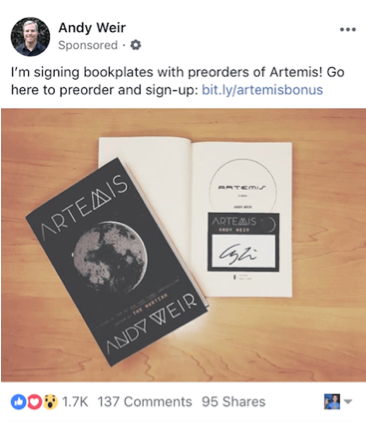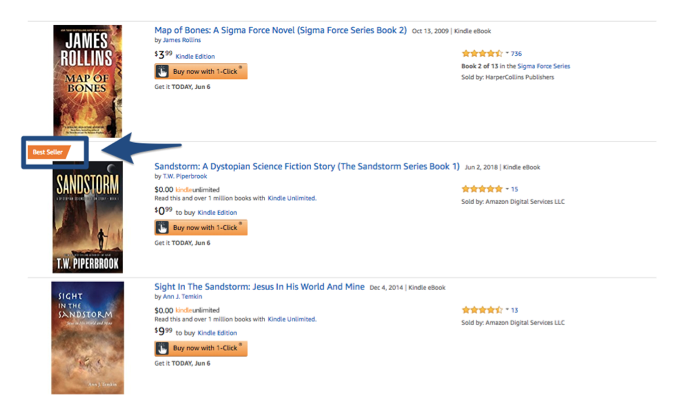
Today’s guest post is by Dave Chesson (@DaveChesson) of Kindlepreneur.
Convincing book shoppers to buy your book is an art form, and not a task.
It’s one thing to know how to setup something technical like an advertisement, an email system, or your book’s sales page on Amazon. However, crafting them so a potential reader will take action is something else.
This was something I honestly struggled with when I first started selling books or working on my websites. I would follow steps presented in tutorials, but would never see the kind of results that others would see.
I was failing at the art of influencing my potential market.
However, a while ago, a friend gave me a book called Influence: The Psychology of Persuasion by Robert Cialdini. He discusses the different principles to the art of influence and how we, as marketers, can create conditions to compel readers to take action.
So, with Robert’s principles in mind, we’ll dive into three that have made the biggest impact, and look at how we can apply these principles to book marketing with specific tactics.
The Law of Reciprocity
Multiple studies have shown that people are geared to want to return a favor. It’s in our nature to feel obligated to take action due to someone else’s request because we don’t want to feel indebted to others.
Therefore, by creating a condition where our target audience feels somewhat like they owe us a simple gesture, we have a higher chance that they will take action upon a clear request. This isn’t about holding something over someone’s head. Instead it’s about making them feel like they want to return the favor. Below are a couple of common tactics to illustrate this.
Offer genuine value to readers on social media
When you understand how you can best serve your readership through your social channels, your engagement will start happening naturally, without the need for desperate pleas. There’s no better example of this than Brian Meeks and his Mastering AMS Ads group. He spends hours every day helping authors and answering their questions. So, it’s no surprise that when his AMS book came out on Amazon, he had an insane amount of buyers and reviews.
Give a priced book for free
Most authors will entice readers to signup for their email list by giving them a book or short story for free. However, if that free book is actually listed with a price of $2.99 or greater elsewhere, an author has not only increased the perceived value of the book, but also proven to the reader that they are giving them value of $2.99+. Readers may not know how much it really costs to produce that book, but the simple $2.99 price tag is all you need to incur the law of reciprocity.
My Favorite Reciprocity Book Tactic
One specific example where an author used the law of reciprocity to an epic level was in Andy Weir’s latest book launch for Artemis. A couple of weeks before the book release, I saw a Facebook ad that said if I pre-ordered a copy of Artemis, and emailed them a copy of the receipt, they’d send me an autographed name plate.

After emailing them my receipt, they now have my email address, and after the book launch, they sent me an email asking if I would leave a review. Just like the law states, I felt obliged to leave a review because of the awesome name plate he shipped to me for free. The best part about this is that his actions were fully compliant with Amazon’s review policy, as you can see explained here.
So, as you craft your Facebook ads, or offer content at your site, think of the law of reciprocity and ways to leverage this to increase your chances of an action being taken by your readers.
Social Proof & Book Validation
We’re always consciously and subconsciously looking for clues of how to behave like others. Seeing that others enjoy something, or have bought something, gives us strength to follow as well. Therefore, if readers see positive indications that other readers like your book, or visit your website, or trust your writing, they are more likely to behave in the same way. Other than reviews, here are other ways you can ethically apply social proof as an author.
Gain best seller status
When you become a best seller in a category on Amazon, your book gets the best seller tag on it. This is a form of social proof that drives people to trust your book more. You can also put it on your website or email signature, but that’s a conversation for another time.

Feature reviews in your editorial review section
If you setup an Amazon Author Central account, you can add reviews that others have made, as well as any authorities you know that can vouch for you. This is powerful if done right, like Jane did on her book The Business of Being a Writer.
Mention awards or recognition
There are many ways authors can find recognition for their books. An example of this is TopSciFiBooks.com which has lists of top perceived books in different subgenres. Imagine the power of claiming that your book is listed as one of the best post-apocalyptic books. Then the next step is to leverage this either in your book description or an editorial review as discussed above.
Liking: If We Like, We Follow and We Buy
This may sound simple, but it’s deceptively powerful. The feeling of “liking” someone can override our logic and other judgmental factors. Have you ever felt a strong sense of liking toward someone or something, and felt very loyal as a result?
But here is where authors get this wrong. Just because someone likes our book doesn’t mean they like us, the author. There are many books that I absolutely love, but I can’t remember the author’s name. Therefore, authors need to engage further and connect in memorable ways.
Craft an author bio that really connects
Your author bio is the one thing that helps you define yourself to your readers. Do not make the mistake of many and treat it like a resume. It’s your one chance to connect with readers and get them to follow you. This can be put on your book, and even on your Amazon Author Page.
Humanize before the review
A tactic that I personally love is that right before I ask for a review at the end of my book, I humanize myself. Sounds silly, but I remind readers that I am an artist who loves writing and I care about what readers say. This helps remind readers of how important that review is, and that I am a human with emotions. You’ll find you’ll not only get more reviews this way, you’ll also get better ones as well.
Put pieces of yourself in your writing
Over 150,000+ people read Kindlepreneur every month. However, to most, I am just a nameless writer. That’s why I find it important to add pictures of myself when they are pertinent and allow some of my personality and background to shine through. Just recently, I wrote an article reviewing Grammarly. In it, I had a personal story about how I used it to check my thesis, and showed a picture of a happy Navy LT holding his master’s degree. This wasn’t about playing the readers or being cheesy. It was just taking an opportunity to remind my readers that there IS a human behind these words. Another place for this is your About Me page on your website. Like your bio, don’t treat it like a resume. Give it a little personality.
Taking Influential Actions
When I was in the Navy, my captain used to tell me that mastery only comes when you combine knowledge with experience. Through this, we create intuition—the ability to see and feel the right decision. So, start looking for opportunities in your own book marketing plan so as to gain experience with the art of influence. Combine that with your knowledge and you’ll start seeing the right path.

Hi, I’m Dave Chesson, and when I’m not chasing little Jedi around the house, I run Kindlepreneur.com, a website devoted to the technical side of book marketing. I love digging deep and analyzing the latest book writing tools and tactics of the trade. I’m also the creator of KDP Rocket, a software that helps to peel back the curtain on Amazon and see the wizard (or book data) behind it.

Hey Dave — I watched a few of your you-tube videos the other day. What a coincidence that your article would arrive in my inbox this morning. You definitely practice what you preach – thanks for the great AMS advice and for being an all-around nice guy. Best of luck – I’ll sign up for your NL now 🙂
Julie
Hi Julie! Awesome and glad you found those videos as well as liked the article. 🙂 That really means a lot to hear.
“Convincing book shoppers to buy your book is an art form, and not a task.”
Bingo. This, right there. Lots of good tips here, Dave, but your opening sentence speaks volumes. I’m marketing my new historical fiction novel right now, and I’m fully enjoying the challenge and the creativity involved. Independent authors shouldn’t run from marketing; they should embrace it as much as figuring out the next twist in their story.
P.S. Love the lead image at top. Haven’t seen it before. Very grabbing.
Thanks Harald and I totally agree!
[…] via The Psychology of Author Marketing — Jane Friedman […]
Great article with a lot of common sense, practical steps authors can take right now. Thanks for the great tips.
Absolutely Chad and thanks!
[…] writers. Bella Mahaya Carter explains how to harness your Yang to succeed, Dave Chesson examines the psychology of author marketing, and L.L. Barkat shares the introverts’ guide to launching a […]